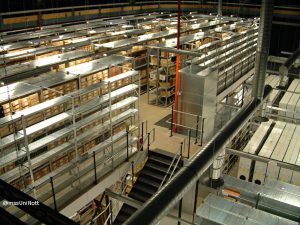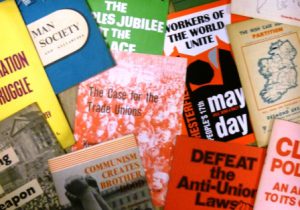November 23, 2017, by Kathryn Steenson
Getting Political with the Archives
“Books have to be heavy because the whole world’s inside them.”
― Cornelia Funke, Inkheart
This is a guest post by student placement Lizzie Fenwick, School of Politics and International Relations.
Prior to signing up for a placement here, I was one of many students on campus who were not really aware that the University of Nottingham Library had a department for Manuscripts and Special Collections. As such, when arriving for my first day I was not at all certain of what to expect from this experience. What I found when I arrived was a veritable treasure trove of collections, the ages of which spanned the centuries. As a self-proclaimed bibliophile, I could quite happily have spent all my time in the store itself surrounded by these little pockets of local (and national) history, however I came here with a job to do. Setting myself up in The Wolfson Reading Room, I began to learn to navigate the stormy seas that archivists like to call ‘The Library Catalogues’. This, I found, was the hardest part of working in the archives, because every collection had its own, somewhat unique, way of being categorised and stored and so to find what you are looking for often takes much longer than expected. However with a little intuition (and a little support from some archive veterans) I was able to wade into these uncharted waters and emerge unscathed.
For most of my time here so far I have been focused on researching the collections of two leading political figures from the East Midlands; Ken Coates, and Fred Westacott. The collective works of these two individuals span a rather significant era of British Politics, when the Communist Party of Great Britain was at its most prominent. Both from working class, mining backgrounds, the ideology of democratic communism is clear through many of their works- particularly during the thirties as a backlash against rising fascism in Eastern Europe and again during the Thatcher years as the trade unions rallied together to oppose the denationalisation of several British industries. The Fred Westacott collection is a thing of beauty as it appears Westacott saved every piece of paper that ever passed through his fingers (although this has created some difficulties for those cataloguing the collection just from the sheer volume of documents). The Coates collection is far more academic, focused more on the theory of communist practices than Westacott’s more involved relationship with politics. Certainly this placement has required that I have a great deal of patience and an eye for small details, however it has also been very rewarding to be immersed so intensely in the life and works of two such important local figures.
No comments yet, fill out a comment to be the first



Leave a Reply